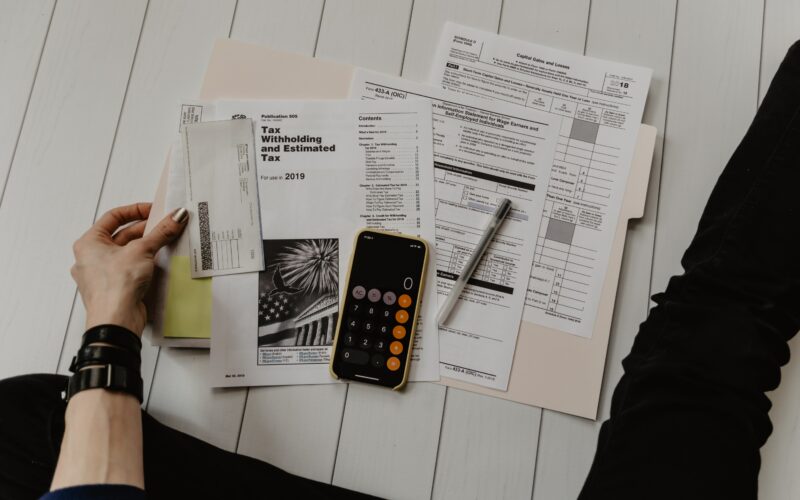It depends. There are a lot of factors that can influence whether you’ll pay capital gains tax on the sale of your grandma’s house, and how much you’ll need to pay.
How you received grandma’s house and how quickly you choose to sell it are two of the biggest factors in the capital gains tax equation, and this article will highlight how these situations affect your yearly tax bill. Because inheritance taxes can be complicated, you should consider consulting a tax or legal advisor if your situation is more complex.
Did You Inherit Grandma’s House?
If grandma left you her house as part of your inheritance, there are some benefits in this scenario. You will only pay capital gains tax when you sell her house. If you plan to live in the home and then pass it onto your children, you won’t have to pay taxes.
However, if you choose to sell her home, you will pay capital gains tax using the step-up in basis.
What Is the Step-Up in Basis Provision?
The tax value of an inherited home is determined by the difference between what the home was worth when you inherited it and what it was worth when you sold it. You can also think of the step-up in basis as the value of the asset when you receive it. The initial cost that your grandparents paid for the home is not considered for your tax purposes.
Math Example: Your grandma purchased a home in 1970 for $25,000, and at the time of her death her home was valued at $250,000. By the time you sell it, it is worth $265,000. You will pay capital gains tax on the $15,000, the difference between the home’s value at her death and the price at selling, not on the difference between her original purchase price and your sale price.
A step-up in basis is used primarily for inheritance purposes. If you were gifted your grandparent’s home before they passed away, this will change your tax liability.
What If Grandma Gave You the House?
If grandma signs over her home’s deed to you before her death, it may complicate your taxes. Gifting family members a piece of property is incredibly generous, but when you’ve been gifted a piece of property, you assume the base cost of the original purchase.
Math Example: Your grandparents paid $25,000 for their home. They give you the home when it is worth $250,000. You choose to sell the home a few years later when it is worth $300,000. Your capital gains tax is based on the difference between the $25,000 your grandparents originally paid for the home, and the $300,000 you sell it for.
There are a few ways to reduce your capital gains tax if you’ve been gifted a family member’s home.
- Live in the home as your primary residence for two out of five years.
- Gift the home to another family member.
- Calculate the depreciation rate of the home using detailed receipts from your grandma.
- Hold onto the home for longer than a year to avoid a short-term capital gains tax.
Should You Wait to Sell Grandma’s House Or Sell It Now?
If you’ve inherited grandma’s house, you can sell it whenever you want. Inherited homes are considered a long-term capital gain when they’re sold, regardless of how long it was owned.
A gifted home, on the other hand, can be subject to long- or short-term capital gains tax. Holding on to the home for more than a year can save you a significant amount in taxes. Other factors, like your tax bracket or filing status, can affect this tax rate as well.
Math Example: If you file married filing jointly (MFJ), and you make between $80,000-$496,600, your long-term capital gains tax is 15%. Your short-term capital gains could be between 22-32%, depending on your income since it is decided by a more complex formula.
What Legal Terms Should You Know If You Inherit a House?
If you’ve inherited your grandma’s house, don’t make the mistake of assuming that the title is free and clear of debts. There are some legal terms you should be aware of as you take possession of your inheritance so that you aren’t surprised by additional claims against the home.
Home Equity Line of Credit (HELOC)- A HELOC is a type of credit that essentially turns your home into a credit card, with your home acting as the collateral in the loan. Sometimes it’s referred to as a second mortgage. If your grandma’s house has a HELOC on it, you will need to pay it off and close the line of credit before you can sell the home.
IRS Lien- If your grandma neglected to pay her federal taxes, the IRS may have placed a lien against her home. Before the home can be sold, the IRS lien must be satisfied.
Due-on-Sale Clause- According to Investopedia, a bank can enforce the due-on-sale clause which “requires the mortgage to be repaid in full upon a sale or conveyance.” Although this cannot be used in the instance of an inherited home, you should still be aware of this legal term since it can be used if a home’s mortgage was transferred to you through another means.
Short-Term Capital Gains- This refers to the profit made after selling an asset that was owned for less than a year.
Long-Term Capital Gains- This refers to the profit made after selling an asset that was owned for longer than a year. The tax rate changes dramatically between the short-term and long-term timelines.
Reverse Mortgage- For cash-strapped older homeowners, a reverse mortgage provides them with a steady income to supplement their retirement funds. It’s also a loan that must be repaid. There are a few different types of reverse mortgages, and you can read more about them here.
Mechanic’s Liens- Unpaid construction work or landscaping may have resulted in a mechanic’s lien on your grandma’s house. Until the contractor is paid off, this lien will remain in place for the work that was completed on the home.
Other Liens- Unpaid property taxes or delinquent utilities may have resulted in other financial institutions, companies, or government agencies placing a lien against the property.
The Bottom Line
Selling a gifted or inherited property can be significantly more complicated than selling your primary residence. Depending on how the home came into your possession, you could owe a small amount of taxes or a significant amount of taxes. There are tax strategies you can employ to reduce your tax burden, so don’t assume that you’ll pay the maximum amount possible. If your situation is more complex, consult a tax professional or attorney to help you navigate the legal ramifications.
Disclaimer: This post was not written or reviewed by a professional financial advisor, and the suggestions should not solely be used to make financial decisions.










